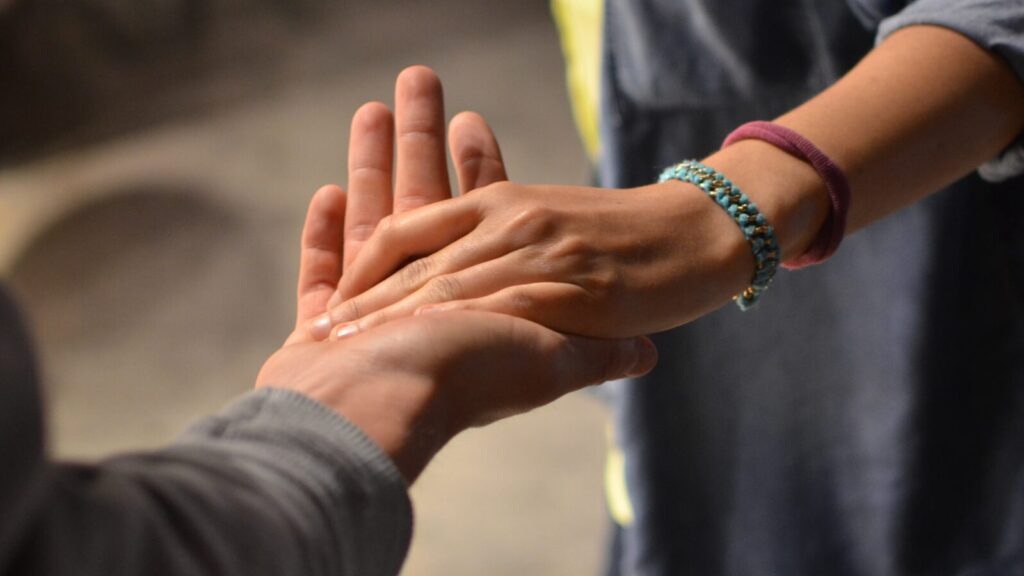Niladri Singh
It is challenging and emotional to help a friend with trauma, and requires both patience and effort on your part. How people deal with trauma also differs, along with the time it takes for someone to come to terms with it.
Trauma, defined by the American Psychological Association as “an emotional response to a terrible event like an accident, rape or natural disaster,” can vary by type and degree. Trauma can also be a response to incidents such as harassment, bias, and discrimination.
It is never pleasant to see someone you love or care about in distress, but overcoming trauma is a process that can neither be skipped nor accelerated. Fortunately, there are several things you can do to help a friend who is dealing with trauma.
https://twitter.com/Shanyylll/status/1524819432127832065
Lend an ear
The easiest and often most beneficial way you can show up for a friend who is struggling is by simply being present and listening. Your job isn’t to heal them from trauma, it’s to support them. Be sure to give them time and to provide space for them to open up.
Conversations about traumatic experiences are difficult and triggering so let them talk at a pace that is comfortable to them, divulging as much or as little information as they choose to. Avoid interrogation at all costs.
Listen, don’t advise
Do not offer advice until they ask for it. More often than not, people only seek a listening ear and if in that moment you can be that, it is more than enough. Avoid telling them what to do, how to feel, or how to cope.
While many decide to seek professional help after experiencing trauma, others might choose not to. This choice is entirely theirs, so it is best not to suggest therapy if it isn’t something they’re ready for.
“Use the same words”
The mental health charity Mind suggests that when we’re speaking to someone who has experienced trauma, we should “use the same words”.
“A harsh or uncaring tone of voice can escalate an already intense conversation”
According to Mind, “It’s their choice whether to talk about being a ‘victim’ or ‘survivor’ of trauma”, highlighting the importance of being mindful of the language we use.
It is helpful to be aware of potential triggers – any words or situations that might cause flashbacks or bring up difficult feelings. Being mindful of the tone of voice you use is also important. A harsh or uncaring tone of voice can escalate an already intense conversation and might trigger some people, so adopting an understanding tone is imperative.
Keep your mind open and judgement-free
Remain calm and don’t judge their feelings. You may never fully comprehend how the other person feels, so don’t question it. Instead, remain neutral and judgement-free and allow them to lead the direction of the conversation.
As a friend, you might feel angry about what has happened to them. While this is an understandable response, it’s often not a helpful one. Remaining calm and supportive over being angry and vengeful will create a safe and comfortable environment for your friend to talk about their feelings.
People who have experienced lots of trauma may regularly find themselves oversharing with strangers. Deep down they’re seeking relief and just need to express their feelings to someone. It feels natural in the moment but sadly shame / regret about oversharing often kicks in.
— TONI TONE (@t0nit0ne) November 9, 2023
Proactive ways you can help
Medical information channel, Better Health, suggests involving the person in physical activity to combat stress hormones.
Start small – a little exercise at home, a walk around the block, repotting plants or any other simple activities that aren’t too strenuous. Not only will this help reduce muscle tension, but will also encourage better sleep.
Offering to help with tasks such as shopping or cleaning can also go a long way, even if you’re just accompanying the friend while they do their odd jobs.
Educate yourself
There are a plethora of online resources about trauma, its symptoms, effects, treatments and ways you can help as a friend. The more you educate yourself on trauma and its impact, the better equipped you will be to assist someone who is dealing with the aftermath of a traumatic experience.
“Being the person someone chooses to open up to might not always be easy”
As a friend, it is important that you too take care of your mental and physical health so to be in the best position to offer a helping hand. Educating yourself on the ways in which you can decompress after a difficult conversation will help you maintain your own well-being and better support your friend.
Be the Safe Space
Traumatic experiences can trap people in the past, but what’s important to remember is that the past doesn’t dictate the future. When someone experiences a traumatising incident, they can lose a sense of self, so providing a safe space for them to work through their emotions is the best way to support them. Acknowledging small achievements, encouraging their passions, and exploring new interests together can make a real difference.
To be someone’s safe space means providing unwavering support, a listening ear without judgment and a shoulder to lean on when everything feels overwhelming. It’s an honour, and with great honour comes great responsibility. Being the person someone chooses to open up to might not always be easy, so it’s essential to approach their trust with tenderness and respect and to handle their vulnerabilities with care.
READ MORE:
Featured image courtesy of Rémi Walle on Unsplash. No changes were made to this image. Image licence found here.


